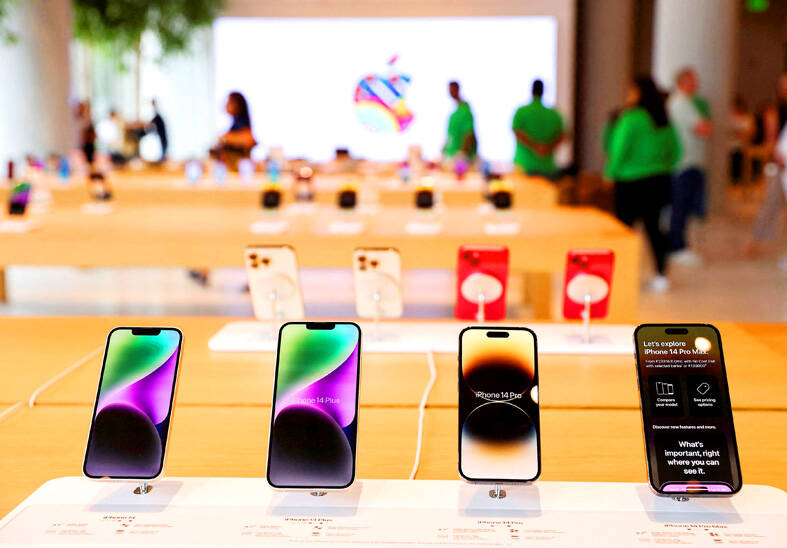Apple Inc assembled US$22 billion worth of iPhones in India in the 12 months ended last month, increasing production by nearly 60 percent over the previous year in a sign of continued diversification away from China.
The Cupertino, California-headquartered company now makes 20 percent, or one in five, of its prized iPhones in the South Asian country, people familiar with the matter said.
The dollar figure represents the devices’ estimated factory gate value, rather than the marked-up retail price.

Photo: Reuters
The ramp-up suggests the iPhone maker and its suppliers are accelerating a pivot to India from China. The bulk of India-made iPhones are assembled at Foxconn Technology Group’s (富士康) factory in southern India. Tata Group’s electronics manufacturing arm, which bought Wistron Corp (緯創) and controls Pegatron Corp’s (和碩) operations, is also a key supplier.
Of the total India production, Apple exported 1.5 trillion rupees (US$17.42 billion) in iPhones from the region in the fiscal year through last month, Indian Minister of Railways, Information and Broadcasting, and Electronics and Information Technology Ashwini Vaishnaw said on Tuesday last week.
Shipments of iPhones from India to the US accelerated after US President Donald Trump announced plans for “reciprocal” tariffs in February, the people said.
Apple’s average India production and exports surged all through the fiscal year to last month.
The Trump administration late on Friday exempted electronics goods including smartphones and computers from its reciprocal tariffs. That is good news for companies such as Apple and Nvidia Corp, although the reprieve does not appear to extend to Trump’s separate 20 percent duty on China, applied to pressure Beijing to crack down on fentanyl.
That also means iPhones made in India would not attract any duties as of now. Barring the exceptions made on Friday, Trump’s cumulative levies on China remain at 145 percent, and would likely force companies such as Apple to intensify their supply chain shift.
However, with nearly 200 suppliers and an overwhelming reliance on China, moves to other countries could take years to play out. Despite Trump’s ambition to have iPhones made in the US, Apple is unlikely to move production there any time soon due to factors including a shortage of facilities and labor needed to produce the devices.
Apple now assembles its entire iPhone range in India, including the more expensive titanium Pro models. Its manufacturing success in the world’s most populous nation is also helped by state subsidies tied to Indian Prime Minister Narendra Modi’s ambition to turn the country into a manufacturing hub.
Modi is also seeking to widen electronics component manufacturing with US$2.7 billion in new financial incentives, and is focused on advancing its semiconductor ambitions.
Apple has a nearly 8 percent market share in India’s smartphone market, where its sales — a bulk of those from iPhones — reached almost US$8 billion in fiscal 2024.

STEEP DECLINE: Yesterday’s drop was the third-steepest in its history, the steepest being Monday’s drop in the wake of the tariff announcement on Wednesday last week Taiwanese stocks continued their heavy sell-off yesterday, as concerns over US tariffs and unwinding of leveraged bets weighed on the market. The benchmark TAIEX plunged 1,068.19 points, or 5.79 percent, to 17,391.76, notching the biggest drop among Asian peers as it hit a 15-month low. The decline came even after the government on late Tuesday authorized the NT$500 billion (US$15.2 billion) National Stabilization Fund (國安基金) to step in to buoy the market amid investors’ worries over tariffs imposed by US President Donald Trump. Yesterday’s decline was the third-steepest in its history, trailing only the declines of 2,065.87 points on Monday and

TAKING STOCK: A Taiwanese cookware firm in Vietnam urged customers to assess inventory or place orders early so shipments can reach the US while tariffs are paused Taiwanese businesses in Vietnam are exploring alternatives after the White House imposed a 46 percent import duty on Vietnamese goods, following US President Donald Trump’s announcement of “reciprocal” tariffs on the US’ trading partners. Lo Shih-liang (羅世良), chairman of Brico Industry Co (裕茂工業), a Taiwanese company that manufactures cast iron cookware and stove components in Vietnam, said that more than 40 percent of his business was tied to the US market, describing the constant US policy shifts as an emotional roller coaster. “I work during the day and stay up all night watching the news. I’ve been following US news until 3am

Six years ago, LVMH’s billionaire CEO Bernard Arnault and US President Donald Trump cut the blue ribbon on a factory in rural Texas that would make designer handbags for Louis Vuitton, one of the world’s best-known luxury brands. However, since the high-profile opening, the factory has faced a host of problems limiting production, 11 former Louis Vuitton employees said. The site has consistently ranked among the worst-performing for Louis Vuitton globally, “significantly” underperforming other facilities, said three former Louis Vuitton workers and a senior industry source, who cited internal rankings shared with staff. The plant’s problems — which have not

TARIFF CONCERNS: The chipmaker cited global uncertainty from US tariffs and a weakening economic outlook, but said its Singapore expansion remains on track Vanguard International Semiconductor Corp (世界先進), a foundry service provider specializing in producing power management and display driver chips, yesterday withdrew its full-year revenue projection of moderate growth for this year, as escalating US tariff tensions raised uncertainty and concern about a potential economic recession. The Hsinchu-based chipmaker in February said revenues this year would grow mildly from last year based on improving supply chain inventory levels and market demand. At the time, it also anticipated gradual quarter revenue growth. However, the US’ sweeping tariff policy has upended the industry’s supply chains and weakened economic prospects for the world economy, it said. “Now